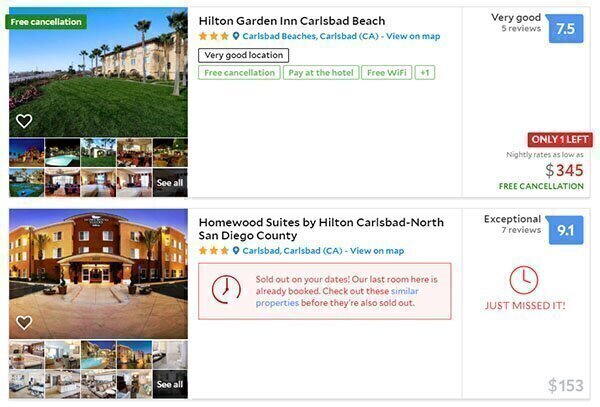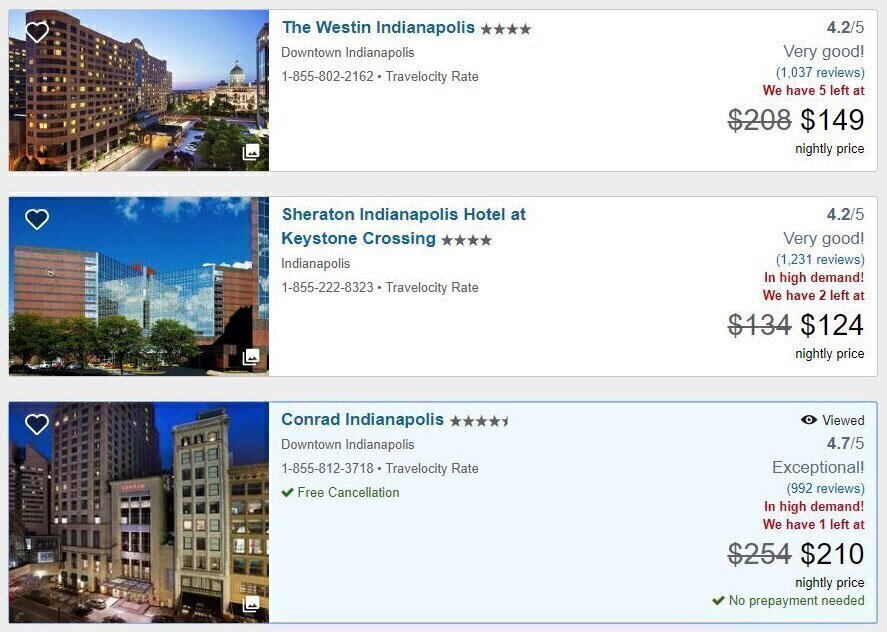Last updated August 2019
It’s the oldest sales trick in the book: Tell customers demand is high and supply low, and if they don’t act quickly an offer will disappear. Many hotel-booking websites take this tactic to extremes. Shop for rooms on many of them, and search results issue constant warnings about scarcity.
For example, as you scroll through listed properties at Agoda.com, details about amenities and rooms for some hotels quickly disappear, replaced by “JUST MISSED IT!” and “Sold out on your dates! Our last room here is already booked. Check out these similar properties before they’re also sold out.” Among hotels that still have rooms available, almost all get a bright red “Popular!” icon or bold warning of low inventory (“ONLY 1 LEFT!”). And if you’re not in panic mode yet, at the bottom of the page a banner pleads “Rooms in [area you’ve searched] are in high demand. Book yours now!” Booking.com, Agoda’s parent site, makes similar breathless calls to book right away before you miss out.
 The search results at Hotels.com (owned by Expedia) paint a similar picture of accommodation drought for most destinations: Many hotels are marked as “Sold Out,” and as you scroll down popups detail the number of people looking at rooms you’re considering. Like on Booking.com, many properties get a prominent red alert—“Only X left” at the price shown.
The search results at Hotels.com (owned by Expedia) paint a similar picture of accommodation drought for most destinations: Many hotels are marked as “Sold Out,” and as you scroll down popups detail the number of people looking at rooms you’re considering. Like on Booking.com, many properties get a prominent red alert—“Only X left” at the price shown.
Checkbook’s researchers spent weeks searching various hotel booking websites. They encountered such high-pressure sales tactics at Agoda, Booking.com, Expedia, Hotels.com, Hotwire, Orbitz, Priceline, and Travelocity. The design of each website constantly indicated that unless we quit our pesky shopping around and booked right away, we’d miss out.
But our investigation found most dire warnings about low availability were dishonest: There’s usually still plenty of room left at the inns. We conducted 80 searches for hotel stays in major cities across these eight websites; all spit out misleading messages. We repeated these searches three times over three weeks. Each time our shoppers got alerts about shortages that typically didn’t exist.
When we searched Agoda for a stay in Las Vegas, it added “ONLY 1 LEFT” next to the Homewood Suites by Hilton listing. We found that referred to only one room type—a “1 King Accessible Roll In Shower Studio Non-Smoking.” There were also three other room types available at that price, and we counted at least 19 rooms available for the same rate. The site still proclaimed “Limited availability” and “This is a popular choice!” next to every option.
One of our searches on Priceline was for a spot in downtown Minneapolis. We received incredibly bad news: For 23 of the first 25 properties shown, the site claimed only one room remained. But when our researchers clicked to book these seemingly near-capacity hotels, they found many rooms were actually available. At the Radisson RED, for instance, dozens of rooms were still up for rent.
So, what gives?
Often, when these websites warn that only one room is left, they’re referring to a cherry-picked room type with low availability. For example, Expedia told us “We have 1 left at $89 per night” for the La Quinta Inn & Suites in downtown Dallas. But after clicking on the listing, we discovered Expedia’s warning applied only to a handicapped-accessible room with a king bed; otherwise, we could select rooms in three other room categories, all available for the same $89 per night.
 This was a typical ploy. We found that most websites’ shortage warnings weren’t on the level; they merely selected obscure room types with low inventory so they could serve up misleading stats on shortages. While it’s technically true a website had only one remaining handicapped-accessible junior queen suite with breakfast, it’s not fair to customers to shout “ONLY 1 LEFT” when more than 25 choices still exist, often for the same price.
This was a typical ploy. We found that most websites’ shortage warnings weren’t on the level; they merely selected obscure room types with low inventory so they could serve up misleading stats on shortages. While it’s technically true a website had only one remaining handicapped-accessible junior queen suite with breakfast, it’s not fair to customers to shout “ONLY 1 LEFT” when more than 25 choices still exist, often for the same price.
But we also often found booking sites don’t even bother to point to obscure room types to falsely advertise low availability. When we searched for one stay on Orbitz, its listing for The L.A. Grand Hotel Downtown claimed only three rooms were left at $211 per night. But a click on the listing yielded two near-identical room choices for that price, and for these other booking option Orbitz reported nine rooms were available at $211 per night. So, combined, Orbitz listed 12 available rooms for $211, and if we were willing to pay $212 per night, there were even more choices.
Even at hotels where we found actual low remaining room counts, the “shortages” lasted for weeks. After conducting our 80 sample searches, we repeated them a week later, and again two weeks after that. Despite cautioning us to “Hurry!” or “Book now!” we found neither availability nor prices suffered with time. In fact, after collecting more than 3,500 hotel rates last year for our article on how to score the best hotel deals, we can assure you there’s no rush: In most scenarios, we found hotel-room prices actually decreased the longer we waited to book.
Among sites we tested, Priceline had the most claims of room shortages. For the 10 searches we conducted using it, on average 21 of its first 25 listings had warnings about low availability. Orbitz was the next-worst in this department, with more than half the listings giving warnings about shortages. And the other six websites also advertised shortages that typically don’t really exist.
These websites clearly work to deter their customers from shopping around and push them to book before it’s “too late.” It’s misleading and dishonest to continually state only one or two rooms remain when the property has plenty.
“Travelers United has been battling online travel agency misinformation for years,” says Charlie Leocha, president and co-founder of the advocacy group. “The practice of claiming ‘Last room available’ is simply a ploy to get unassuming consumers to purchase accommodations. The practice may not be technically illegal, however, it is certainly misleading and intended to be so. When two major companies, Expedia and Booking Holdings, own almost all of the online travel agencies, their claims of not having another room at the same price are ludicrous.”
 The Federal Trade Commission recently studied the travel industry’s use of these and other selling practices but chose not to act to prevent them. But the United Kingdom’s Competition and Markets Authority recently clamped down on these high-pressure tactics—by September 1, websites must cease displaying misleading claims in the U.K. about shortages.
The Federal Trade Commission recently studied the travel industry’s use of these and other selling practices but chose not to act to prevent them. But the United Kingdom’s Competition and Markets Authority recently clamped down on these high-pressure tactics—by September 1, websites must cease displaying misleading claims in the U.K. about shortages.
We asked Booking and Expedia to comment on our findings. Each told us they believe customers find the stats their websites provide on availability are useful. Booking’s spokesperson also pointed out that usually rooms reserved on its websites can be canceled, so “if you change your mind, no harm, no foul.”
We found several sites don’t try to stress out their customers: Google.com/travel, Kayak, momondo, Travelzoo, and trivago don’t display these kinds of warnings.
But it’s difficult to give Kayak, momondo, and trivago much credit, given that they are operated by Booking or Expedia, which also own the websites that display misleading claims about availability. These websites and Google often send their users to book at websites that deceive.


